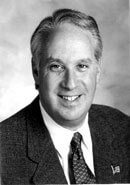Chancellor acknowledges lack of teachers and outdated curriculum on HIV
Chancellor Joel I. Klein acknowledged that the city’s public schools were not delivering effective HIV training or sex education to the city’s 1.1 million students at a February 5 joint hearing held by the state Assembly’s education and health committees.
“Let me acknowledge the obvious at the outset,” Klein said. “We need to foster healthy lifestyles among our young people and I think we’re beginning to take steps… While we are moving in the right direction we have a lot more work to do.”
Describing the state of the current health curriculum as “problems I inherited,” Klein said the city education department was struggling with a tight budget and the challenge of developing new HIV and sex education courses.
“We need to do this in a realistic, orderly way and we also need the resources,” he said.
Following Klein’s testimony, Dr. Roger Platt, director of school health for the city’s education department, told the committee that the HIV curriculum for elementary schools was updated in 1992, for middle schools in 1995, and for high schools in 1996.
New York is one of 38 states, along with the District of Columbia, that require HIV education in public schools. New York also requires that the department get community input into the HIV curriculum so while Platt said developing a new program would start “very shortly,” he would not say when it would be complete.
“On the HIV/AIDS side I am reluctant to make a commitment because the process involved is an extensive one,” he said.
In 1992, when the public schools tried to implement the “Children of the Rainbow” curriculum, controversy erupted in many local school districts. Four pages in that 443-page teacher’s guide, referring to gays and lesbians, outraged conservative opponents.
That curriculum, coupled with an effort to expand condom distribution in city schools, eventually cost Joe Fernandez, then the schools chancellor, his job.
Even though New York State does not require sex education in its public schools, unlike 22 other states and the District of Columbia, the education department is also updating that 20-year-old curriculum. The city only has 196 certified heath educators who can teach Family Life Sex Education, as the sex education curriculum is called, because it requires, in part, 30 hours of training to master.
“It’s pretty hard to justify a 30-hour commitment to learn a 20-year-old curriculum,” Platt said.
A report issued last year by Assemblymember Scott Stringer found widespread deficiencies among city school districts in complying with HIV and sex education requirements.
“We’ve got to make health education as important as reading and writing,” the Upper West Side Democrat said at the hearing. “There is no comprehensive health education in the public school system.”
Other witnesses who testified during the daylong hearing included representatives from the New York AIDS Coalition, the Lesbian, Gay, Bisexual and Transgender Community Center, Planned Parenthood of New York City, and the New York Civil Liberties Union.
Noticeably absent from the hearing were right wing voices that have traditionally opposed sex education and discussions of HIV in the public schools. Two people signed in at the hearing, as representatives from “World Vision N.Y.” but never testified.
World Vision bills itself as a “relief and development” organization, but it also gives financial support to right wing groups such as Focus on the Family, the Family Research Council, Coral Ridge Ministries, and a number of pro-life groups.
Stringer told Gay City News that “everyone was invited” to testify and that he believed there would be less controversy over a sex education curriculum today.
“We’ve come a long way,” he said. “The public is more sophisticated.”


































